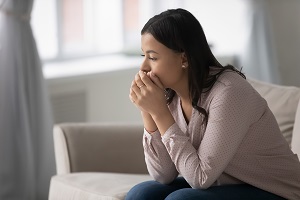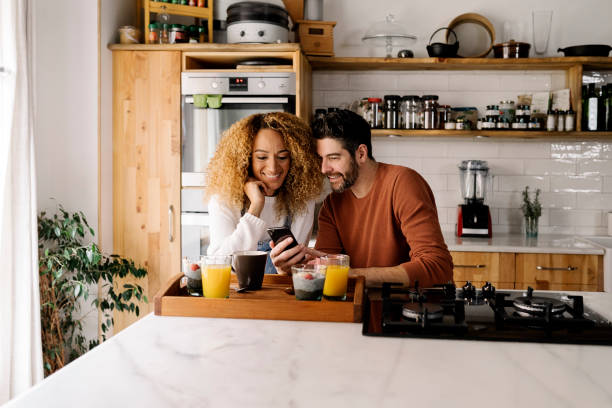“I can’t wait for my quarantine anxiety and my back to school anxiety
to meet my holiday anxiety.”
This tweet sums it up. So far this year, every anxiety we experienced collectively followed another set of anxiety. The normal anxiety met with quarantine anxiety; then came the back-to-school anxiety. This was followed by election anxiety. And here we are, taking on the holiday anxiety.

Holiday stress and anxiety are not new. For many years, people complain about how their rumination, excessive worry, people-pleasing, and emotional eating worsened during the holidays. We feel responsible for seeing all our loved ones, travel out of state so kids can spend time with their grandparents, chase after sales so that you can stay within budget, and stay up late to decorate the house and wrap presents. We then lose the motivation to stay on track with our physical health goals. We get out of the holiday season feeling burnout and exhausted. While the memories are irreplaceable, most people report their cup is depleted rather than full by the end of it all.
How are the holiday stress and anxiety showing up this year in 2020?
This season, you may find yourself having worries that you never had to deal with. You might be asking yourself, “are they sticking to their pod?” “have they been practicing social distancing?” “have they been following the CDC guidelines?” “will they hug my child even though I have asked them not to?” “How will they react when we decide to stay at home?”
The holidays are coming and maybe you are feeling irritable, nervous, stressed, sad, excited, lonely, grief, relieved, or burnout.
Maybe you are feeling another wave of loss for the missed opportunities and moments. If you can’t travel or have family over, you may be feeling lonely and sad. The loss of the big family gathering can be upsetting. On the contrary, you may also find yourself feeling relieved. You may feel relaxed that you don’t have to travel on the holidays with kids. You can enjoy the simplicity of being home, maybe in your pajamas, and just doing things that make you happy. More importantly, it is OK if you feel caught up in both of these mixed feelings.
Why do holidays give us anxiety and stress?
1) We set unrealistic expectations of ourselves and from others during the holiday:

We hear that this is the most magical time of the year when special memories are made. We feel a sense of pressure to make it unforgettable for everyone. Feeling responsible for others’ feelings during a special day is very anxiety-provoking. We feel responsible when it is our loved one’s birthday, a wedding anniversary, or Mother or Father’s day. We feel a sense of responsibility to make this day “special” for our loved ones. We expect ourselves to pick the best gift, make the best reservation, and choose the best activity for the day. Underneath all these expectations, we experience fear. The fear of disappointing the other person, the fear that the day won’t be as great and wonderful as they hoped it to be, the fear that they won’t feel loved or special if it is not a grandiose day, the fear that we missed a small detail.
Feeling responsible for making the holidays special brings on similar pressure and fear. We worry that someone will get upset or feel let down by us; someone is going to feel forgotten or unimportant. We feel the pressure to make each one of our loved ones feel special and loved. This is all too much and feeds into the holiday stress and anxiety.
The past also plays a role in how we set high expectations of the present time. We try hard to compensate for any past failed holiday. Sometimes, it can be the past we had as a child. We try hard to make sure our adult holiday memories are nothing like the ones we experienced. We try hard to give to our children what we didn’t have. Sometimes, it doesn’t even have to be the childhood memories we are trying to correct. If we had a “bad” holiday season a year before, we feel the pressure to have a re-do, to make up for it.
This type of unrealistic expectation is amplified because of the lost opportunities of the year due to the lockdown and the quarantine. If you feel like you have missed out on a lot, then you may want to make the holiday seasons extra special. For some, this could mean setting up the Christmas tree in November. For others, we might try to make it up by overbooking our calendar with holiday Zoom calls. This will stretch you too thin and increase the holiday stress.
2) We feel extra financial stress during the holidays:

When I think of holidays, I can’t help but always remember those cliché holiday commercials when a family member gets out of their house and sees a fancy new car with a big giant red bow on top of it. Everywhere you look, you see all of these great sales. You are told how you will be missing out on the best deal of the year if you don’t act on it. Your inbox is filled with advertisements from major stores with their discounted items. I think the pressure to spend money had gone out of control when the infamous Black Friday sales started to take off on the afternoon of Thanksgiving day. Inevitably, the families feel the pressure to spoil their loved ones through gift-giving. About 60% of Americans report that their anxiety during the holidays is due to money issues. According to research in a 2016 study, the average American spent around $900 on gifts alone. The financial costs of the season are multiplied by the travel costs or hosting dinners. You may find yourself in a stressful situation if your income was affected by the economic recession. If you feel like you spent more than usual during the holiday season or find out that this holiday you have less budget than the years before, it can be a big factor in feeling the holiday stress and anxiety.
3) Holidays can bring up unresolved feelings and memories:
Holidays trigger the blues and depression. The Holiday Blues are temporary depression caused by excessive stress, unrealistic expectations, and memories associated with the season. If you experienced a loss, holidays can be a painful reminder of how you don’t get to make new memories with your loved one who has passed away. Most commonly, holidays can be triggering for those who had past traumatic experiences associated with the holidays. Also, holidays can be a time where you feel reminded of your unmet goals and needs. For example, if you have an estranged relationship with your family members, the holidays can remind the dysfunction. If you recently experienced a divorce or a break-up, the holiday can season can represent your “failed” relationship. If you are visiting family during the holidays, being back at your home town can remind you of past family conflicts, past failed relationships, or past rejections. Many unresolved underlying feelings and issues resurface during the holidays.
4) Ongoing mental health issues don’t take a break because it is the holidays:
Mental health conditions, like Generalized Anxiety, OCD, Addiction, Depression, among other conditions, don’t magically pause or go away simply because it is the holiday season. You find yourself dealing with the intensity of your mental health needs as the world enters into a highly stimulating celebratory period. People are louder, more demanding, and more impatient while managing your anxiety, addiction, or depression. As a parent, you may feel the pressure to parent while coping with your anxiety, depression, or recovery. You might worry about having a panic attack in front of others, you may worry about being triggered and manage the urges to relapse, you may feel guilty to get some rest when the kids want to bake cookies for Santa. It is hard to tell if the holiday season increases anxiety, or underlying anxiety makes the holidays more difficult. Nonetheless, the fact is, it can be a challenging combination for many people.
6 Tools for Dealing with Holiday Stress and Anxiety:
1) Make time for self-care:
In order to enjoy the holidays, it is most important to find a balance. The balance between work and play; balance between resting and decorating; balance between alone time and family time. Not every second of the holiday season has to be spent on holiday activities or with other people. Especially, this year, we have to accept and embrace that this holiday will look and feel different. This is not a bad or a good thing. When you commit to having a balance in your schedule, you need to allow yourself to rest. You need to create a routine that ensures that your needs don’t come last. In your routine, you can be consistent with just a few small steps, such as waking up at the same time every day, having meals around the same time every day, and engage in one activity that grounds you and brings you calm and peace.
2) Challenge the thoughts behind your holiday anxiety:
Behind every feeling of anxiety, exhaustion, and stress, lies unhealthy and rigid thought patterns. Any time you want to lessen the intensity of your emotions, it is necessary to challenge and reframe the thoughts that may be feeding in the emotions. Start by recognizing the thoughts you are having around this holiday season. Does any of these sound familiar to you – “this holiday season has to be perfect;” “I must do it all,” “everyone has to be happy,” “I have to feel happy, not anxious right now,” or “I don’t want to upset anyone.” Instead of holding on to these anxious thoughts, practice more compassionate and supportive thoughts.
Here are some of my favorites:
- I give myself permission to slow down and find joy and peace this season.
- It is Okay if everything is not perfect.
- I am allowed to say no.
- It is not my job to make everyone happy.
- I have tools I can use to cope with my feelings.
- I can ride this wave of anxiety.
3) Practice being in the present moment:
We often live in the past or the future instead of the present moment. During the holidays, we often think about the family gathering we had, the words that were exchanged, or we think into the future and create scenarios on how the upcoming family dinner is going to go. We worry if the gift we ordered will arrive on time. We worry if our little one is going to get enough sleep on Christmas eve. We stress over what we are going to cook for dinner and whether we will have enough time to make everything. All of these worries and stress hijack us from the present moment. During this holiday season, remember to be present. Remember to soak in the moment wholeheartedly. Use your five senses to embrace a moment. Try to find your breath to bring you back to the present moment. Mindfully pay attention to what your body needs. Ask yourself, “do I need to rest right now or move my body?” “Do I need to eat something or not?” Staying busy doesn’t necessarily bring more meaning to the moment. It is quantity over quality. Lastly, to be present by avoiding social media, news, or any other technology. While the news or social media accounts may feel like we are staying connected, it can distract us from being in the present moment and getting rest.
4) Set boundaries:
Our time and mental health are precious. It is worth protecting. Therefore, we need to spend our time on things that matter. Start by identifying your values. From the list, choose your three top values and make sure your holiday calendar is balanced between those values. Maybe your top three values are family, friends, and physical health, or you chose family, rest, and church. Make sure you do not commit to events that are not part of these values.
To stick to healthy boundaries, create some guidelines. What are the dos and don’ts during this holiday season. Remember, you don’t have to see everyone every year. You don’t have to do it all. You are not responsible for everyone’s happiness.
Specific to holidays in 2020, you may need to set boundaries around:
Your decisions to only gather with three families outside
- Your preference to stay 6-feet distance from others and wear masks
- Commentary about finances, unemployment, or your goals
5) Let go of Perfectionism:
Be Imperfect! The holiday season is not a competition. It is not all on you to make this a perfect holiday. Instead of going the extra mile, keep things simple. Take something off your to-do list. Maybe don’t repeat certain traditions if that particular tradition that was a little extra. For example, last year, I decided to skip on the holiday cards. Especially after having my daughter, I made sure we had our private mini-photo shoot on the first Christmas of the year. The second Christmas we celebrated with her, I made sure we took our picture with Santa. The third year, and guess what? there were no photo shoots, no Santa pictures, no holiday cards. I completely skipped it. For any family and friends who thought of us and sent us their lovely holiday cards, I made sure to reach out to them, sometimes just a text message, thanking them for thinking of us and saying some nice words about their family photo. That’s it.
6) Ask for help:
Don’t mask your mental health needs. It is Ok to start therapy right before the holiday season or during. There is no need to push it until next year. It is also OK to increase your therapy sessions if you are already working with a therapist. It may also help seek medication consultation and discuss with your psychiatrist if there is a need to adjust your medications to meet the unique challenges of this time of the year.
Embracing You Therapy Group Practice
Here at Embracing You Therapy, we invite you to explore with us how life would be different if you had more control over your thoughts and emotions, and we invite you to consider that it is possible to accept things just as they are, embracing imperfections to create a gentler place for calm in your life.
Let’s learn what drives your unique perspective on anxiety and stress. Then, let’s find the tools-your unique tools-that help you respond to life in a healthy, calm way. Contact us today for your complimentary 15-minute phone consultation with one of our Client Care Coordinators.





